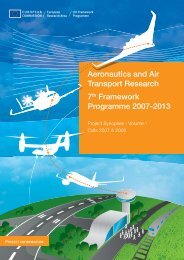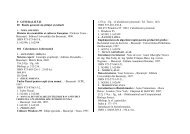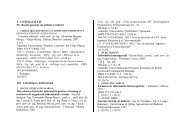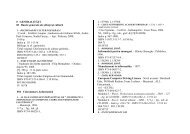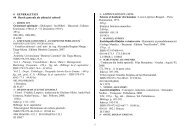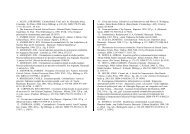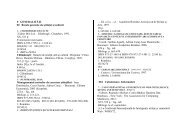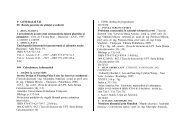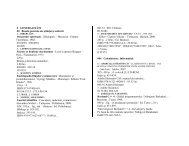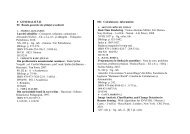Create successful ePaper yourself
Turn your PDF publications into a flip-book with our unique Google optimized e-Paper software.
Regions setting the example<br />
The participants had many concrete<br />
examples of innovative and sustainable<br />
solutions to bring to the table. Juan<br />
Alario from the EIB presented ELENA<br />
(European Local Energy Assistance),<br />
a technical assistance facility helping<br />
cities and regions to prepare<br />
sustainable energy projects for EIB<br />
funding. He explained that ELENA<br />
projects were designed to be<br />
replicated elsewhere, thereby<br />
helping to spread good practices.<br />
Financed through the EU’s Intelligent<br />
Energy – Europe programme, ELENA<br />
provides support for projects such as<br />
sustainable building or environmentallyfriendly<br />
transport.<br />
In the Czech Republic, energy efficiency<br />
measures in the building sector co-financed<br />
through the ERDF have resulted in a reduction of air<br />
pollution and CO 2<br />
emissions, operational savings for firms,<br />
the creation of green jobs as well as a healthier environment.<br />
Other showcase projects include the PIKE project for access to<br />
e-government services and the B3 regions’ actions for Better<br />
BroadBand connection to tackle the digital divide.<br />
The Regions for Economic Change initiative was launched in<br />
2006 in order to provide regions with an opportunity to<br />
influence policies in an efficient and coordinated way. It is<br />
financed through the INTERREG IVC and URBACT II programmes.<br />
finD oUT morE:<br />
http://ec.europa.eu/regional_policy/conferences/sustainablegrowth/home_en.cfm<br />
Committee of the Regions Forum<br />
on exclusion<br />
The Europe 2020 Strategy with its strategic objective of ‘inclusive<br />
growth’ and the European Year for Combating Poverty and<br />
Social Exclusion 2010 have put poverty and social exclusion<br />
issues firmly in the spotlight.<br />
Within this context, the EU's Committee of the Regions organised<br />
a forum on local and regional responses to poverty and social<br />
exclusion on 8 June. The aim was to showcase some of the<br />
numerous examples of actions on the ground as a way to help<br />
translate local action into national and European policy. In light<br />
of rising unemployment and fiscal constraints in the wake of<br />
the economic crisis, these actions have taken on even more<br />
importance.<br />
The conference focused on three broad themes: making local<br />
social services more accessible to all, preparing people for<br />
integration into the labour market, and providing for inclusive<br />
citizenship in urban and rural areas. Local project managers<br />
and other regional stakeholders from across the EU shared their<br />
own experiences of the many approaches in addressing these<br />
questions. The wide range of best practice examples shared a<br />
common focus on disadvantaged groups of society – children<br />
living in poverty, refugees and asylum seekers, unemployed<br />
young people, people with disabilities, or homeless people.<br />
In the concluding session participants argued for a better<br />
understanding of the multiple needs of disadvantaged<br />
individuals and an approach building on individual strengths<br />
– talents, interests, skills and qualifications. This approach was<br />
reflected in many of the successful projects which focused<br />
particularly on fostering enthusiasm and motivation as well as<br />
on empowering people to take back control of their own lives.<br />
As one project example from Scotland summed up the idea:<br />
"Nothing About Us Without Us is For Us".<br />
panorama 35<br />
27



